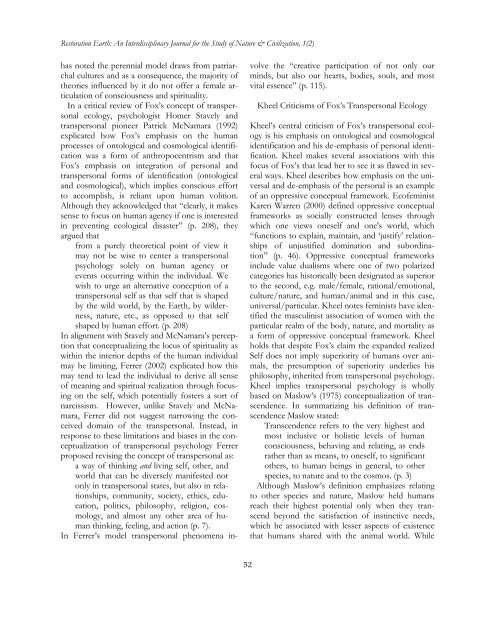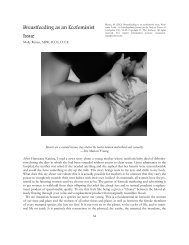RE:IJSNC, Issue 1, Volume 2, May 2012 - Ocean Seminary College
RE:IJSNC, Issue 1, Volume 2, May 2012 - Ocean Seminary College
RE:IJSNC, Issue 1, Volume 2, May 2012 - Ocean Seminary College
You also want an ePaper? Increase the reach of your titles
YUMPU automatically turns print PDFs into web optimized ePapers that Google loves.
Restoration Earth: An Interdisciplinary Journal for the Study of Nature & Civilization, 1(2)<br />
has noted the perennial model draws from patriarchal<br />
cultures and as a consequence, the majority of<br />
theories influenced by it do not offer a female articulation<br />
of consciousness and spirituality.<br />
In a critical review of Fox’s concept of transpersonal<br />
ecology, psychologist Homer Stavely and<br />
transpersonal pioneer Patrick McNamara (1992)<br />
explicated how Fox’s emphasis on the human<br />
processes of ontological and cosmological identification<br />
was a form of anthropocentrism and that<br />
Fox’s emphasis on integration of personal and<br />
transpersonal forms of identification (ontological<br />
and cosmological), which implies conscious effort<br />
to accomplish, is reliant upon human volition.<br />
Although they acknowledged that “clearly, it makes<br />
sense to focus on human agency if one is interested<br />
in preventing ecological disaster” (p. 208), they<br />
argued that<br />
from a purely theoretical point of view it<br />
may not be wise to center a transpersonal<br />
psychology solely on human agency or<br />
events occurring within the individual. We<br />
wish to urge an alternative conception of a<br />
transpersonal self as that self that is shaped<br />
by the wild world, by the Earth, by wilderness,<br />
nature, etc., as opposed to that self<br />
shaped by human effort. (p. 208)<br />
In alignment with Stavely and McNamara’s perception<br />
that conceptualizing the locus of spirituality as<br />
within the interior depths of the human individual<br />
may be limiting, Ferrer (2002) explicated how this<br />
may tend to lead the individual to derive all sense<br />
of meaning and spiritual realization through focusing<br />
on the self, which potentially fosters a sort of<br />
narcissism. However, unlike Stavely and McNamara,<br />
Ferrer did not suggest narrowing the conceived<br />
domain of the transpersonal. Instead, in<br />
response to these limitations and biases in the conceptualization<br />
of transpersonal psychology Ferrer<br />
proposed revising the concept of transpersonal as:<br />
a way of thinking and living self, other, and<br />
world that can be diversely manifested not<br />
only in transpersonal states, but also in relationships,<br />
community, society, ethics, education,<br />
politics, philosophy, religion, cosmology,<br />
and almost any other area of human<br />
thinking, feeling, and action (p. 7).<br />
In Ferrer’s model transpersonal phenomena in-<br />
52<br />
volve the “creative participation of not only our<br />
minds, but also our hearts, bodies, souls, and most<br />
vital essence” (p. 115).<br />
Kheel Criticisms of Fox’s Transpersonal Ecology<br />
Kheel’s central criticism of Fox’s transpersonal ecology<br />
is his emphasis on ontological and cosmological<br />
identification and his de-emphasis of personal identification.<br />
Kheel makes several associations with this<br />
focus of Fox’s that lead her to see it as flawed in several<br />
ways. Kheel describes how emphasis on the universal<br />
and de-emphasis of the personal is an example<br />
of an oppressive conceptual framework. Ecofeminist<br />
Karen Warren (2000) defined oppressive conceptual<br />
frameworks as socially constructed lenses through<br />
which one views oneself and one's world, which<br />
“functions to explain, maintain, and ‘justify’ relationships<br />
of unjustified domination and subordination”<br />
(p. 46). Oppressive conceptual frameworks<br />
include value dualisms where one of two polarized<br />
categories has historically been designated as superior<br />
to the second, e.g. male/female, rational/emotional,<br />
culture/nature, and human/animal and in this case,<br />
universal/particular. Kheel notes feminists have identified<br />
the masculinist association of women with the<br />
particular realm of the body, nature, and mortality as<br />
a form of oppressive conceptual framework. Kheel<br />
holds that despite Fox’s claim the expanded realized<br />
Self does not imply superiority of humans over animals,<br />
the presumption of superiority underlies his<br />
philosophy, inherited from transpersonal psychology.<br />
Kheel implies transpersonal psychology is wholly<br />
based on Maslow’s (1975) conceptualization of transcendence.<br />
In summarizing his definition of transcendence<br />
Maslow stated:<br />
Transcendence refers to the very highest and<br />
most inclusive or holistic levels of human<br />
consciousness, behaving and relating, as ends<br />
rather than as means, to oneself, to significant<br />
others, to human beings in general, to other<br />
species, to nature and to the cosmos. (p. 3)<br />
Although Maslow’s definition emphasizes relating<br />
to other species and nature, Maslow held humans<br />
reach their highest potential only when they transcend<br />
beyond the satisfaction of instinctive needs,<br />
which he associated with lesser aspects of existence<br />
that humans shared with the animal world. While



